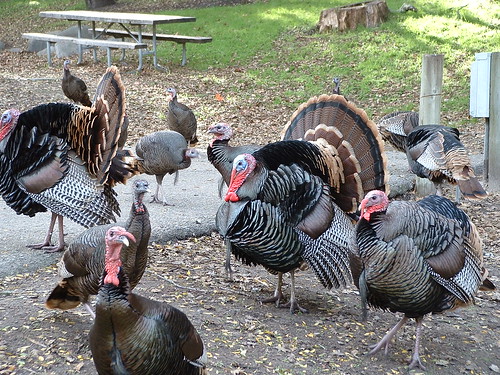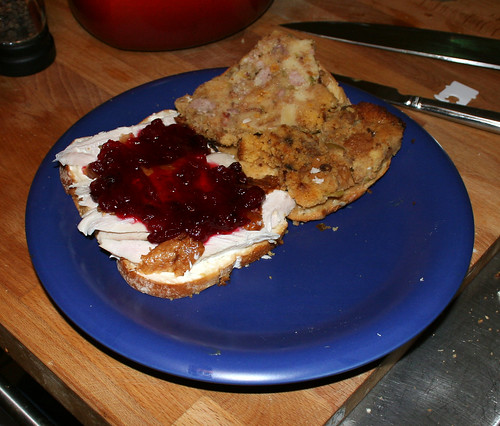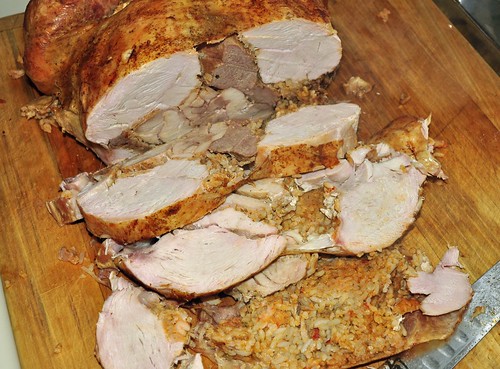
Turkeys, by Hey Paul
[Photo: CC BY 2.0 by Hey Paul]
With Thanksgiving just a few days away, we thought we’d take a look at words related to that big dumb bird, the turkey.
Where does the word turkey come from? In short, it’s named for the country Turkey, “from a confusion with the guinea fowl, once believed to have originated in Turkish territory.” According to the Online Etymology Dictionary, the “Turkish name for [the bird] is hindi,” literally “Indian,” “based on the common misconception that the New World was eastern Asia.” The Virtual Linguist says “the original full name of the bird was turkey-cock, but this applied to a different bird — the guinea-fowl, a native of Africa,” while Dan Jurafsky at The Language of Food traces the bird’s history, from its domestication in south-central Mexico to its journey to Europe and the U.S.
How about those turkey sounds? Gobble, which also means “to swallow in large pieces” and “to seize upon with greed,” is imitative in origin and comes from the Middle English gobben, “to drink greedily.” Gobben probably comes from gobbe, “lump, mouthful.” Related are gob, “a mouthful; a little mass or collection; the mouth,” gobbet, goblet, and gobsmacked.
Related also is gobbledygook, nonsense or unclear jargon. The word was first used in 1944 by Congressman Maury Maverick (a grandson of Samuel Augustus Maverick, “an American cattleman who left the calves in his herd unbranded,” for whom the word maverick is named) in a memo banning “gobbledygook language.” As for its origin, “Maverick said he made up the word in imitation of turkey noise.”
The word cluck,“to utter the call or cry of a brooding hen or a hen with young chicks,” comes from the Old English cloccian, which is imitative in origin. A Turkish word for turkey is culuk. Jollop is another word for the cry of a turkey, and according to World Wide Words “was at one time a name for the wattles of the bird, probably from dewlap.” Another meaning for jollop is “a strong liquor or medicine,” also spelled jalap and perhaps influenced by the word dollop.
How about turkey sayings and slang meanings? Turkey meaning “a failure, especially a failed theatrical production or movie,” attests to 1927 while the meaning “a person considered inept or undesirable,” is from 1951. Both come from the idea of the turkey being a silly and stupid animal. The meaning “three consecutive strikes in bowling,” may come from a 19th century American tradition of awarding a turkey to such a bowler.
Turkey also has the lesser-known meaning of “a bag containing a lumber-jack’s outfit.” The origin is unknown, though perhaps it’s named for the bag’s turkey-like appearance. A blind turkey is a sack “stuffed with rags or waste, “deaconed” with a tattered pair of overalls and of a pair of shoes and designed to deceive those labor agents who decline ship laborers who have not baggage stand hostage for their arrival at the job.” To hoist the turkey means “to take one’s personal belongings and leave camp.”
Talk turkey means “to talk or negotiate plainly, frankly, or seriously.” World Wide Words says the phrase was first recorded in 1824 “but is probably much older,” and originally meant “to speak agreeably, or to say pleasant things.” This meaning may come from “the nature of family conversation around the Thanksgiving dinner table,” or “because the first contacts between Native Americans and settlers often centred on the supply of wild turkeys.” The most complex explanation is:
a story about a colonist and a native who went hunting, agreeing to share their spoils equally. At the end of the day, the bag was four crows and four turkeys. The colonist tried to partition the spoils by saying “here’s a crow for you” to the Indian, then keeping a turkey to himself, giving another crow to the Indian, and so on. At this point the Indian very reasonably protested, saying “you talk all turkey for you. Only talk crow for Indian”.
The meaning changed to “frank talk” in the 19th century when “to ‘talk turkey’ was augmented” to “talk cold turkey,” with no relation to cold turkey’s meaning of “immediate, complete withdrawal from something on which one has become dependent, such as an addictive drug.” This meaning of cold turkey stems from 1910 and came from the idea that “cold turkey is a food that requires little preparation, so ‘to quit like cold turkey’ is to do so suddenly and without preparation.”
A jive turkey is “someone who is jiving, as in behaving in a glib and disingenuous fashion.” The turkey portion of the phrase presumably comes from the word’s meaning of a stupid person while jive’s origin is more complex. The word’s meanings of “to deceive playfully,” “empty, misleading talk,” and “a style of fast, lively jazz and dance music” attest to 1928. Some claim the origin is the language of the Wolof, “West African people primarily inhabiting coastal Senegal.” However, others doubt this claim, saying that:
although the Wolof are relatively prominent to many Americans because of the large number of Senegalese immigrants in this country, and to black Americans because the Goree Island slaving settlement is a popular tourist attraction, the fact is that there is no evidence that Wolof speakers were predominant among slaves in the United States, numerically or culturally.
Other turkey phrases include turkey-shoot, “a rifle-shooting match in which a live turkey is the target and the prize,” which gives us the figurative meaning of “something easy.” A turkeycock is “a pompous or self-important person,” probably from the image of a strutting male turkey. The turkey-trot is “an eccentric ragtime dance, danced with the feet well apart and with a characteristic rise on the ball of the foot, followed by a drop upon the heel,” which was popular in the early 20th century.
Has all this turkey talk gotten you hungry? How about some tofurkey, “a meat substitute resembling turkey, usually made from tofu,” or unturkey, “a vegetarian substitute for turkey, particularly a turkey-shaped ‘bird’ made with wheat gluten, soy, and other vegetarian ingredients”? If meat’s your thing, then you might want a turducken, a turkey stuffed with a duck stuffed with a chicken, or a turbaconducken, a turducken with each bird wrapped in bacon. “It’s a real lardapalooza!” as Fritinancy says.
Or you may want to try the turducken of desserts, the cherpumple, “a three-layer cake with an entire pie baked into each layer—a cherry pie baked inside a white cake, a pumpkin pie baked inside a yellow cake and an apple pie baked inside a spice cake.”
For even more Thanksgivine-related fare, check out Fritinancy’s post on how Butterball got its name, her terrific roundup of fun turkey and Thanksgiving related info, and Cracked’s list of the five most insane versions of Thanksgiving from around the world.


